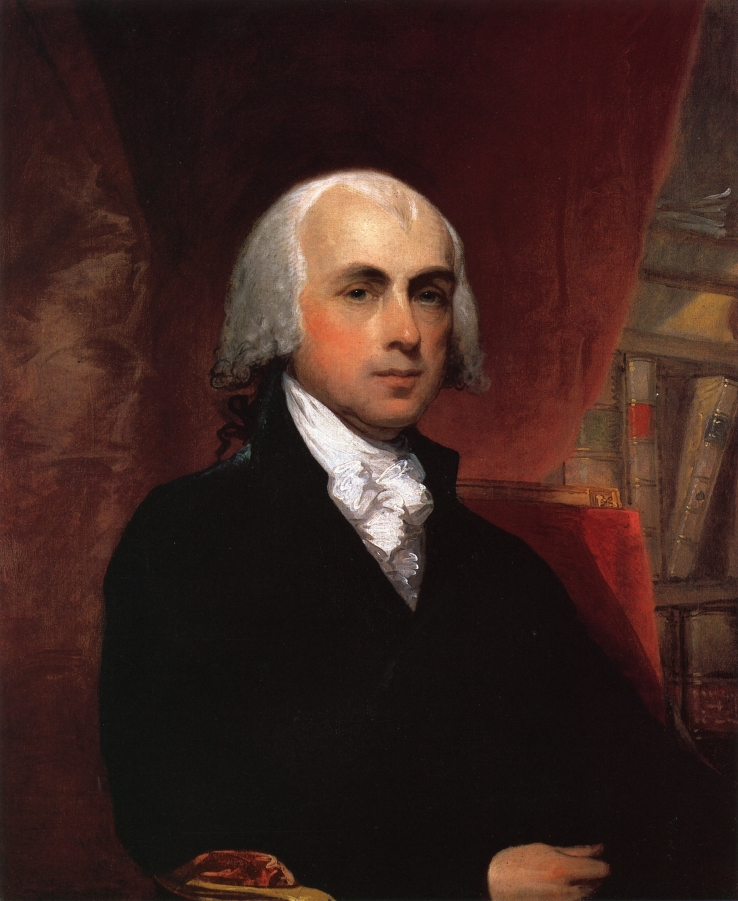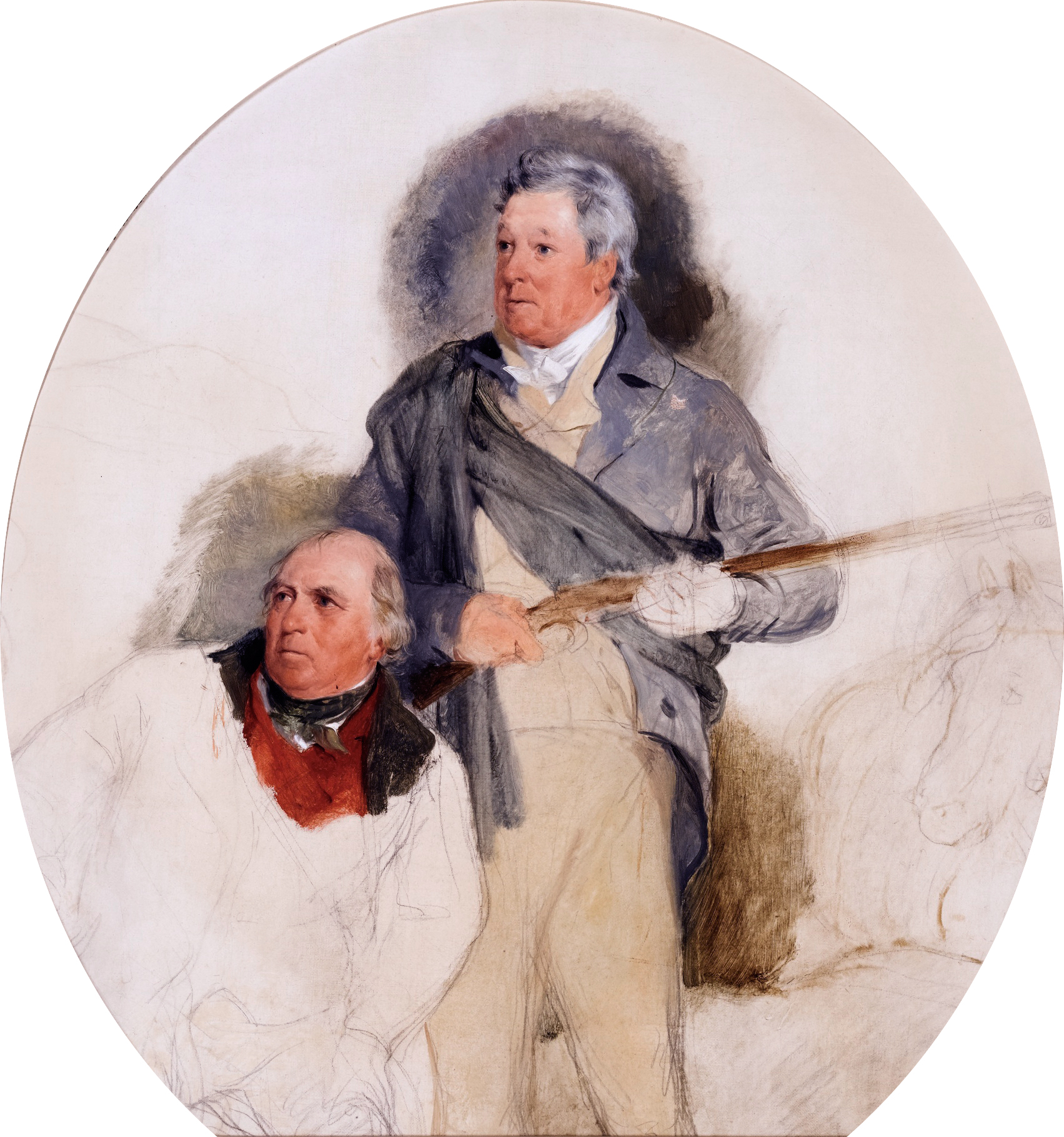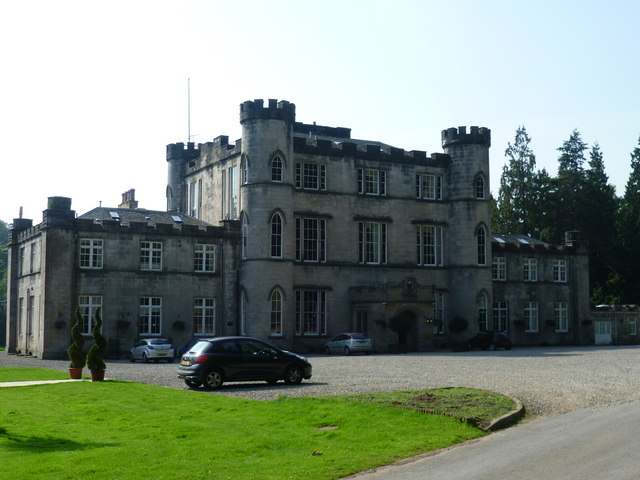|
Robert Hay-Drummond, 10th Earl Of Kinnoull
Robert Auriol Hay-Drummond, 10th Earl of Kinnoull (18 March 1751 – 19 April 1804) was a Scottish peer and Lord Lyon King of Arms. His titles were Earl of Kinnoull, Viscount Dupplin and Lord Hay of Kinfauns in the Peerage of Scotland and Baron Hay of Pedwardine in the Peerage of Great Britain. Biography Robert Auriol Hay-Drummond was the eldest son of the Most Rev. and Rt. Hon. Robert Hay Drummond, the Archbishop of York, and Henrietta Auriol. In 1739, his father Robert Hay took on the Drummond name and arms as heir of entail of his great-grandfather William, Viscount Strathallan. Robert Hay-Drummond succeeded to the title of Earl of Kinnoull on 27 December 1787 on the death of his uncle, Thomas Hay. From 1796, when he was sworn of the Privy Council, until his death in 1804, Lord Kinnoull served as Lord Lyon King of Arms. He was succeeded as Lord Lyon and in the earldom of Kinnoull by his son Thomas. On 19 April 1779, Hay-Drummond married his first wife, Julia Eyre. On 8 ... [...More Info...] [...Related Items...] OR: [Wikipedia] [Google] [Baidu] |
The Right Honourable
''The Right Honourable'' (abbreviation: The Rt Hon. or variations) is an honorific Style (form of address), style traditionally applied to certain persons and collective bodies in the United Kingdom, the former British Empire, and the Commonwealth of Nations. The term is predominantly used today as a style associated with the holding of certain senior public offices in the United Kingdom, Canada, New Zealand, and, to a lesser extent, Australia. ''Right'' in this context is an adverb meaning 'very' or 'fully'. Grammatically, ''The Right Honourable'' is an adjectival phrase which gives information about a person. As such, it is not considered correct to apply it in direct address, nor to use it on its own as a title in place of a name; but rather it is used in the Grammatical person, third person along with a name or noun to be modified. ''Right'' may be abbreviated to ''Rt'', and ''Honourable'' to ''Hon.'', or both. ''The'' is sometimes dropped in written abbreviated form, but is ... [...More Info...] [...Related Items...] OR: [Wikipedia] [Google] [Baidu] |
Thomas Harley (politician, Born 1730)
The Honourable Thomas Harley (24 August 1730 – 1 December 1804) was a British politician who sat in the House of Commons for 41 years from 1761 to 1802. Harley was the fourth son of Edward Harley, 3rd Earl of Oxford and Earl Mortimer and educated at Westminster School. He became an alderman of London, Sheriff of London in 1764 and Lord Mayor of London in 1767. He served as Member of Parliament (United Kingdom), Member of Parliament for City of London (UK Parliament constituency), London from 1761 to 1774 and then for his native Herefordshire (UK Parliament constituency), Herefordshire for most of the rest of his life. In 1775 he bought the Berrington estate near Eye, Herefordshire from the Cornewall family and built Berrington Hall in 1778–1781 in place of an older house. It is now classified as a Grade I listed building. He was elected Mayor of Shrewsbury for 1784–85 and appointed Lord Lieutenant of Radnorshire for April 1791 to August 1804. He died in December, 1804 ... [...More Info...] [...Related Items...] OR: [Wikipedia] [Google] [Baidu] |
Lord Lyon Kings Of Arms
Lord is an appellation for a person or deity who has authority, control, or power over others, acting as a master, chief, or ruler. The appellation can also denote certain persons who hold a title of the peerage in the United Kingdom, or are entitled to courtesy titles. The collective "Lords" can refer to a group or body of peers. Etymology According to the ''Oxford Dictionary of English'', the etymology of the word can be traced back to the Old English word ''hlāford'' which originated from ''hlāfweard'' meaning "loaf-ward" or "bread-keeper", reflecting the Germanic tribal custom of a chieftain providing food for his followers. The appellation "lord" is primarily applied to men, while for women the appellation "lady" is used. This is no longer universal: the Lord of Mann, a title previously held by the Queen of the United Kingdom, and female Lords Mayor are examples of women who are styled as "Lord". Historical usage Feudalism Under the feudal system, "lord" had a wi ... [...More Info...] [...Related Items...] OR: [Wikipedia] [Google] [Baidu] |
Earls Of Kinnoull
Earl of Kinnoull (sometimes spelled Earl of Kinnoul) is a title in the Peerage of Scotland. It was created in 1633 for George Hay, 1st Earl of Kinnoull, George Hay, 1st Viscount of Dupplin. Other associated titles are: ''Viscount Dupplin'' and ''Lord Hay of Kinfauns'' (1627) and ''Baron Hay of Pedwardine'' (1711). The former two are in the Peerage of Scotland, while the third is in the Peerage of Great Britain. The title of Viscount Dupplin is the courtesy title for the Earl's eldest son and heir. History The Hay clan descends from Norman-born knight William II de Haya, Guillaume de la Haye, who was Butler of Scotland, pincerna (cup bearer or butler) to Malcolm IV and William the Lion. Charles I of England, Charles I advanced George Hay, 1st Earl of Kinnoull, Sir George Hay to the peerage on 4 May 1627 under the titles of Lord Hay of Kinfauns and Viscount Dupplin. On 25 May 1633, Hay was created the Earl of Kinnoull by King Charles I of England, Charles I. The Hay family sha ... [...More Info...] [...Related Items...] OR: [Wikipedia] [Google] [Baidu] |
1804 Deaths
Events January–March * January 1 – Haiti gains independence from France, and becomes the first black republic. * February 4 – The Sokoto Caliphate is founded in West Africa. * February 14 – The First Serbian uprising begins the Serbian Revolution. By 1817, the Principality of Serbia will have proclaimed self-rule from the Ottoman Empire, the first nation-state in Europe to do so. * February 15 – New Jersey becomes the last of the northern United States to abolish slavery. * February 16 – First Barbary War: Stephen Decatur leads a raid to burn the pirate-held frigate at Tripoli to deny her further use by the captors. * February 18 – Ohio University is chartered by the Ohio General Assembly. * February 20 – Hobart is established in its permanent location in Van Diemen's Land (modern-day Tasmania) as a British penal colony. * February 21 – Cornishman Richard Trevithick's newly built ''Penydarren'' steam locomotive operates on the Merthyr Tramroad, betwe ... [...More Info...] [...Related Items...] OR: [Wikipedia] [Google] [Baidu] |
1751 Births
In Britain and its colonies (except Scotland), 1751 only had 282 days due to the Calendar (New Style) Act 1750, which ended the year on 31 December (rather than nearly three months later according to its previous rule). Events January–March * January 1 – As the Province of Georgia undergoes the transition from a trustee-operated territory to a Crown colony, the prohibition against slavery is lifted by the Trustees for the Establishment of the Colony of Georgia in America. At the time, the Black population of Georgia is approximately 400 people, who had been kept in slavery in violation of the law. By 1790, the enslaved population of Georgia increases to over 29,000 and to 462,000 by 1860. * January 7 – The University of Pennsylvania, conceived 12 years earlier by Benjamin Franklin and its other trustees to provide non-denominational higher education "to train young people for leadership in business, government and public service". rather than for t ... [...More Info...] [...Related Items...] OR: [Wikipedia] [Google] [Baidu] |
John Murray, 4th Duke Of Atholl
John Murray, 4th Duke of Atholl, KT, PC, FRS (30 June 1755 – 29 September 1830), styled Marquess of Tullibardine from 1764 to 1774, was a Scottish peer. Life and career Murray was the eldest son of John Murray, 3rd Duke of Atholl, and his wife, Charlotte, 8th Baroness Strange, daughter of James Murray, 2nd Duke of Atholl. His parents were first cousins. Lord George Murray and Lord Charles Murray-Aynsley were his younger brothers. He became known by the courtesy title Marquess of Tullibardine when his father succeeded to the dukedom in 1764. Murray succeeded his father as fourth Duke of Atholl in 1774 and was elected a Scottish representative peer. In 1786 he was created Baron Murray, of Stanley in the County of Gloucester, and Earl Strange in the Peerage of Great Britain, which gave him an automatic seat in the House of Lords. He later served as Lord-Lieutenant of Perthshire from 1794 to 1830 and was sworn of the Privy Council in 1797. In 1800, he was made a Knight o ... [...More Info...] [...Related Items...] OR: [Wikipedia] [Google] [Baidu] |
Bishop Of Rochester
The Bishop of Rochester is the Ordinary (officer), ordinary of the Church of England's Diocese of Rochester in the Province of Canterbury. The town of Rochester, Kent, Rochester has the bishop's seat, at the Rochester Cathedral, Cathedral Church of Christ and the Blessed Virgin Mary, which was founded as a Catholic Church, Catholic cathedral in 604. After the English Reformation, during the late 17th and 18th centuries, it was customary for the Bishop of Rochester to also be appointed Dean of Westminster. Te practice ended in 1802. The diocese covers two London boroughs and West Kent, which includes Medway and Maidstone. The bishop's residence is Bishopscourt in Rochester. His Latin episcopal signature is: "(firstname) Roffen", ''Roffensis'' being the genitive case of the Latin name of the see. The office was created in 604 at the founding of the diocese in the Kingdom of Kent under Æthelberht of Kent, King Æthelberht. Jonathan Gibbs (bishop), Jonathan Gibbs has served as B ... [...More Info...] [...Related Items...] OR: [Wikipedia] [Google] [Baidu] |
George Murray (bishop Of Rochester)
George Murray (12 January 1784 – 16 February 1860) was an Anglican bishop. He was Bishop of Rochester from 1827 until his death in 1860. He was previously the Archdeacon of Man, Dean of Worcester and Bishop of Sodor and Man. Background and education Murray was born in Farnham, Surrey, the second son of George Murray, Bishop of St David's, himself the second son of John Murray, 3rd Duke of Atholl, Chief of Clan Murray. Murray's mother, Anne Charlotte (d.1844), was the daughter of Francis Grant (MP and general); she served as Lady-in-Waiting to Charlotte of Mecklenburg-Strelitz (wife of George III). Murray's youngest sister was Amelia was also a courtier, and a writer. Murray attended Harrow before matriculating at Christ Church, Oxford, on 22 December 1801, graduating Bachelor of Arts (BA) in 1806, proceeding Oxford Master of Arts (MA Oxon) in 1810, and Doctor of Divinity (DD) by diploma on 13 March 1814. Ministry On 29 September 1808, Murray was installed, like his fathe ... [...More Info...] [...Related Items...] OR: [Wikipedia] [Google] [Baidu] |
River Earn
The River Earn () in Scotland leaves Loch Earn at St Fillans and runs east through Strathearn, then east and south, joining the River Tay near Abernethy. The Earn is about long. It passes by Comrie, Crieff (where it is joined by the Pow of Inchaffray) and Bridge of Earn. The river is fast flowing, with many shoals, whilst the surrounding land is generally flat and is occasionally subject to flooding. Near to the River Earn lay the ancient Strageath Roman Camp. This camp was one of a series of camps used by the Romans to construct their invasion of the north; other notable camps in this chain are Ardoch, Stracathro, Battledykes, Raedykes and Normandykes. Leisure and tourism The river is popular for walking, and the banks are accessible at many points. One of the most popular walks is a route along the north bank at Crieff known as Lady Mary's Walk. Fishing Fishing is available on many sections of the river. The Earn forms part of the area of the Tay District Salmon F ... [...More Info...] [...Related Items...] OR: [Wikipedia] [Google] [Baidu] |
Henry Dundas, 1st Viscount Melville
Henry Dundas, 1st Viscount Melville, PC, FRSE (28 April 1742 – 28 May 1811), styled as Lord Melville from 1802, was a British politician who served as Home Secretary from 1791 to 1794 and First Lord of the Admirality from 1804 to 1805. He was instrumental in the encouragement of the Scottish Enlightenment, in the prosecution of the war against France, and in the expansion of British influence in India. Prime Minister William Pitt appointed him Lord of Trade (1784–1786), Home Secretary (1791–1794), President of the Board of Control for Indian Affairs (1793–1801), Secretary at War (1794–1801) and First Lord of the Admiralty (1804–1805). As a political boss, Dundas's deft and almost absolute power over Scottish politics during a long period in which no monarch visited the country led to him being nicknamed "King Harry the Ninth", the "Grand Manager of Scotland" (a play on the masonic office of Grand Master of Scotland), and "The Uncrowned King of Scotland. ... [...More Info...] [...Related Items...] OR: [Wikipedia] [Google] [Baidu] |
Lord Mayor Of London
The Lord Mayor of London is the Mayors in England, mayor of the City of London, England, and the Leader of the council, leader of the City of London Corporation. Within the City, the Lord Mayor is accorded Order of precedence, precedence over all individuals except the Monarchy of the United Kingdom, sovereign and retains various traditional powers, rights, and privileges, including the title and Style (manner of address), style ''The Right Honourable Lord Mayor of London''. One of the world's oldest continuously elected Civil office, civic offices, it is entirely separate from the directly elected mayor of London, a political office controlling a budget which covers the much larger area of Greater London. The Corporation of London changed its name to the City of London Corporation in 2006, and accordingly the title Lord Mayor of the City of London was introduced, so as to avoid confusion with that of Mayor of London. The legal and commonly used title remains ''Lord Mayor of Lo ... [...More Info...] [...Related Items...] OR: [Wikipedia] [Google] [Baidu] |








